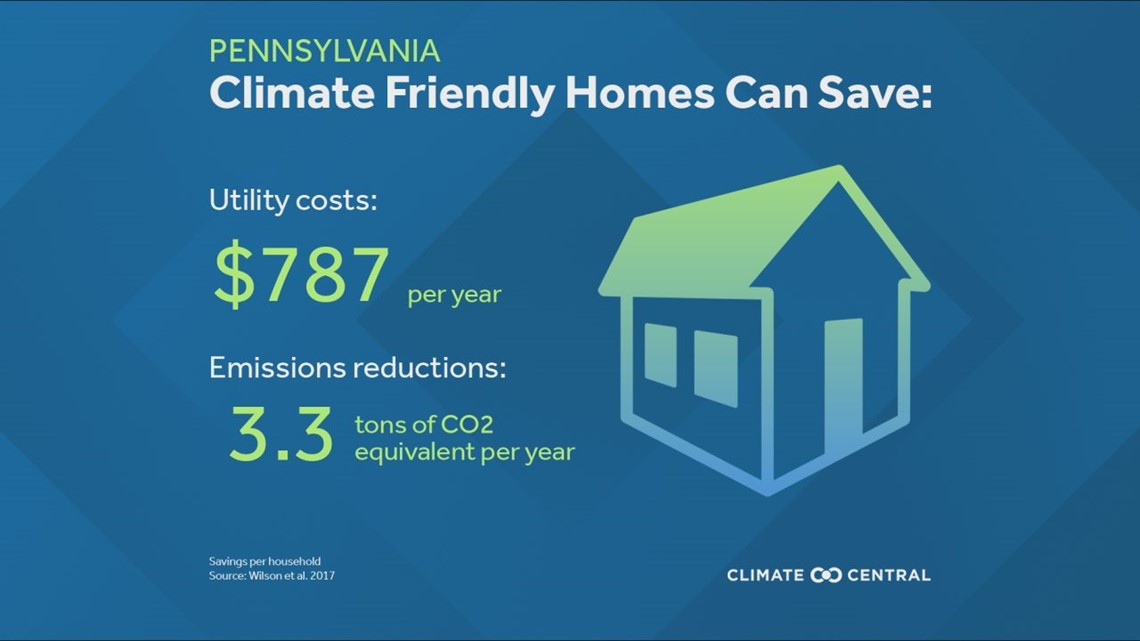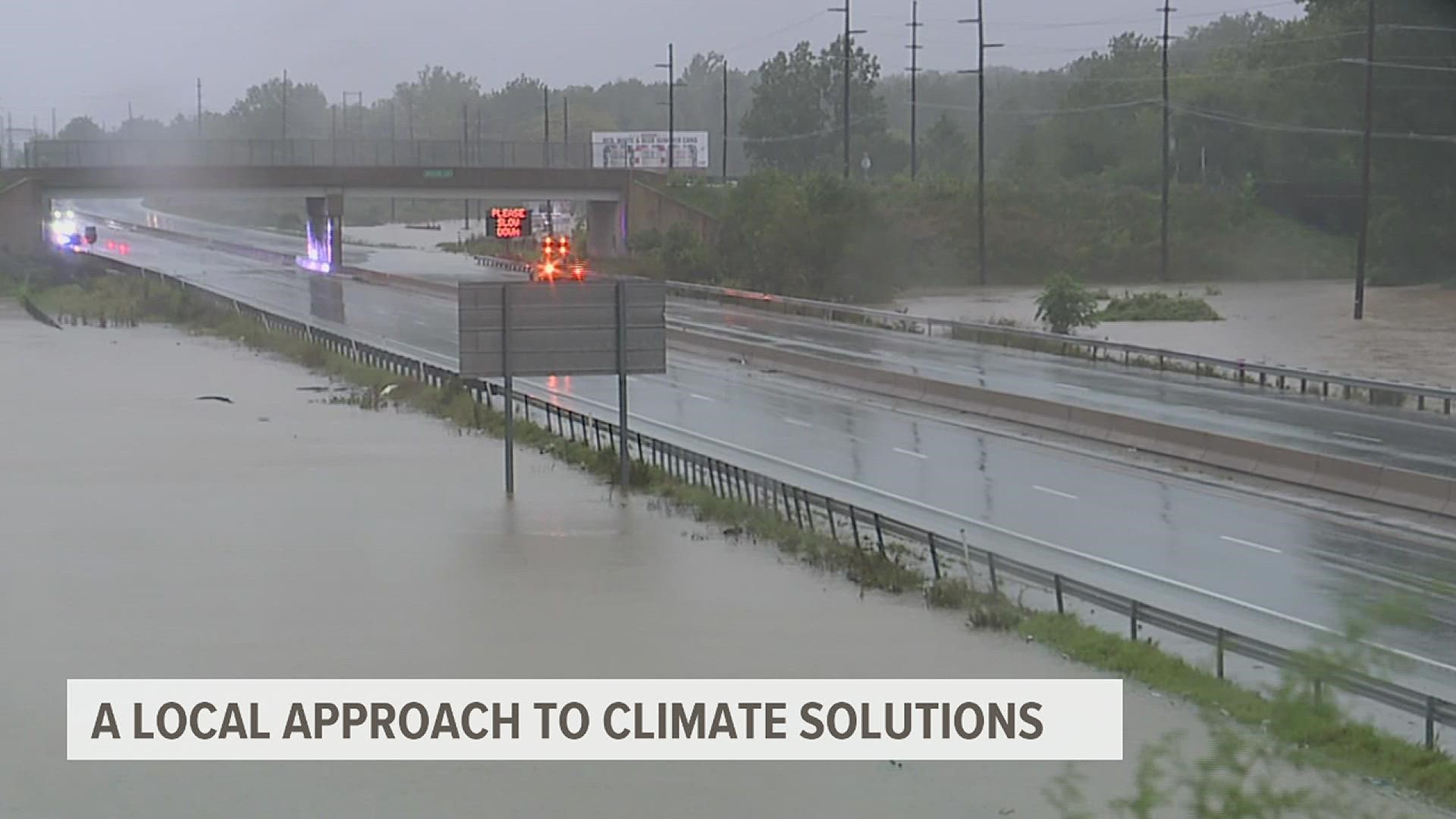LITITZ, Pa. — The impacts of our warming climate are being felt today, right here in Pennsylvania, with heavier, more frequent rainfall events, increasing temperatures, longer allergy seasons, and more.
To respond and help fight this climate crisis, the Department of Environmental Protection releases a Climate Action Plan for the state every three years. Their latest plan, released in September of this year, places a focus on equity and environmental justice, laying out a path to reducing greenhouse gas emissions, and targeting adaptation actions for those most at risk.
“They’re seeing the severity of the impacts in their communities and so they’re looking for things to do," says Dave Althoff, Director of the Department of Environmental Protection's Energy Programs Office. “We focus our climate communication on what’s happening in Pennsylvania. And, you know, that really points us towards the weather events, flooding events, heat waves, weather swings, locally extreme storms… everybody can see that this stuff is happening.”
Alongside the Climate Action Plans for the state, DEP also works to help local municipalities, universities, and more develop action plans too.
One community taking a lead in creating a plan as well as adapting to our warming climate? Warwick Township in Lancaster County.
“This is not going to happen overnight. It’s small, incremental steps that you take. But it does take consistency of messaging to the public that, ‘this is important, we should be doing this," says Dan Zimmerman, outgoing Township Manager for Warwick Township.
What started as a call from community members to clean the water in Lititz Run in the mid-90s turned into restored floodplains, trees planted, and the removal of dams.
“That alone, just the removal of all those dams, they were low flow dams, allowed for or eliminated the backup of water and causing major flooding," says Zimmerman.


Residents have noticed the decrease in major flooding. But the township’s plan is not just to adapt to climate change, it also includes reducing their impact and greenhouse gas emissions.
“We looked at how we could reduce the energy consumption," Zimmerman tells Fox43. "Sustainability, a lot of times, is also about being cost effective, it goes hand and hand, and everybody likes to save money.”
In a 2009-2010 carbon audit, the township reported a decrease in carbon emissions in one year by over 2,000 tons, or 12%. Zimmerman says this is something they have continued to reduce.
Outside of towns and municipalities adopting climate action plans, many small businesses in the area are also making sustainability as a top priority. This includes Tröegs Independent Brewing in Derry Township, Dauphin County, which is currently installing solar panels on their roof.
“It’s 1,698 panels, so it’s quite a few. We’re estimating that it should generate just under 20% of what our current electrical needs are," Chris Trogner, co-founder of Tröegs Independent Brewing tells Fox43. "So we think that’s a pretty cool and exciting project to be working on.”
Tröegs latest project not only includes the new solar panels, but also replacing insulation on their roof and also installing a reflective roof to help with energy efficiency.
“We’ve always tried to find ways to kind of reduce our energy uses or environmental impact. So for us electricity is a big one, CO2 is a big one and also water, so we look at our water to beer ratios," says Trogner. “It makes us feel better about the energy needs that we have to make beer knowing that we can kind of minimize our impact but also produce some of our own.”
Climate solutions are not just for businesses or governments to handle. Every person has actions they can take to not only reduce energy usage, but to help save some cash too. One method gaining popularity these days is electric vehicles.
Lindsay Byron, Environmental Group Officer in the Energy Programs Office at DEP, says that she expects to continue to see a buildout of vehicle charging infrastructure and the use of electric vehicles in general across PA.
“We continue to increase the use of electric vehicles across the state. 2021 is on track to be a record year for electric vehicle registrations across Pennsylvania," says Byron.
Other ways to be more efficient include installing a high efficiency heat pump, energy smart appliances or thermostats, and making sure you are properly insulated and using LED lighting.
A study by Climate Central shows that climate friendly homes in Pennsylvania could save up to $787 dollars and could reduce 3.3 tons of CO2 every year.


Climate solutions are not as hard as they might seem when you look at it on a smaller scale.
“Folks pick and choose the things that make sense for them, the things that have benefits for them such that they are maybe modernizing their infrastructure, they are saving money, and it also has the co-benefit of reducing emissions and fighting climate change," says Althoff.

